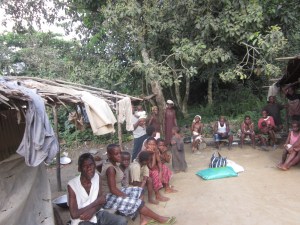

What you will see and
enjoy in Cameroon, West Africa during our
tours: Roughly the size of
California and with a population of approximately 16
million, Cameroon is the 14th most populous African
nation, ranking 58th globally It is one of Africa's most
naturally and culturally diverse countries. In addition
to its British and French colonial past, there are more
than 130 ethnic groups (including Pygmy,Bamileke, and
Fulani) speaking dozens of languages. Ritual masks, many
with intricate feather and beadwork created by these
groups, are prized by collectors worldwide.
Yaounde is located in the
southwestern corner of the country, about 125 miles from
thesouthern border; it is a bustling urban center of
meandering streets and undulating hills, and is home to
some excellent museums, including the Musée d'Art
Cameroonais, with one ofthe best collections of
Cameroonian art in the world. The nearby Musée
d'Art Nègre display Bamoun pipesfrom the north of
the country, Congolese-Zairian masks and Baoulé
textiles fromCôte D'Ivoire, as well as pieces from
Algeria and Ethiopia. For shopping, the Centre Artesanal,
at the northern end of the city, is a giant tentfilled
with local artisans and their handicrafts. Gastronomical
note: Yaoundeis famed throughout the continent for its
grilled chicken. Cameroon Travel Industry
Professionals' Promotional Tour Information Contact
Africa Travel Association headquarters (212) 447-1926; or
visit ATA web site: www.africa-ata.org ATA Membership Symposium in
Cameroon Information All travel agents, tour operators,
group organizers, environmentalists, and tradeand
investment specialists, are invited to participate, but
they must become members of ATA. The registration fee ($725 per
person/doubleoccupancy; $925 single occupancy) includes
all Symposium functions, five nightshotel accommodation
at the Hilton Yaounde (including the Host Country
overnightstay), breakfast, and most meals. Special symposium air rates will
be announced shortly. The Africa Travel Association
(ATA) is an international, nonprofit, nonpolitical,travel
industry association established in 1975 to promote
tourism to thecontinent of Africa. Its membershipincludes
African Government Tourism Offices, international
airlines, hoteliers,cruise lines, tour operators, travel
agents, tourism educators and publicrelations/marketing
firms. ATA is a member of the American Society of Travel
Agents (ASTA); World Tourism Organization (WTO); and an
industry partnerin the "Green Globe" program. For more information about ATA
membership and Ecotourism Symposium registration,please
contact Marilyn Eugene, ATA Headquarters, 347
Fifth Avenue, Suite 610,New York, NY
10016 Email:
mailto:africatravelasso@aol.com
More about
Cameroon: This strategic location of the country,
which stretches from the Atlantic Ocean South of the
Equator to the Sahel, has made Cameroon a country
characterized by extremely diversified fauna and flora,
climate and landscapes, and by a multitude of customs and
traditions (240 ethnic groups). The Coastal
zone, with natural beaches in Kribi and Limbe and
many colorful bays, is appropriate for sea-side
tourism. The Central and
South-Western parts of the country with their
ever-green vegetation are suitable places for excursions,
picnics and ecotourism. There are three
ecological sites worth visiting in
particular.
There are
: The Dja
Reserve classified as a world heritage site by
UNESCO; it is one of the few remaining gorilla
sanctuaries in the world Mount-Cameroon
(4070) high) an active volcano with a flora which can be
traced back to the Quaternary. The Korup
National Park, a living museum of over 30 million
years old where you can find more than 400 plant species,
including medicinal plants; zoo bird species; 174
reptiles and amphibians, as well as 140 fish species
living in the various rivers that cross the
Park. The Western
region has a temperate climate and a mountainous
landscape. It is considered as the stronghold for
Cameroon's folklore and handicraft. The Northern
part, with its numerous national parks and enchanting
landscapes is a godsend for lovers of safari photo and
hunting Moreover, a
legendary political stability and a favorable legal
framework are factors conductive to tourism investment in
Cameroon. That is Cameroon,
an emergent destination to discover . For
information or to register for the ATA Ecotourism
Symposium Ministry of
Tourism Tourism
Information Bureau for Europe : http://www.cameroun-infotourisme.com Guidebooks Information by
Elimbi Ebenezer
Official ATA News
Release with details on the Symposium
(click
here)
A geographical crazy
quilt, the landscape changes from modern cities complete
with urbansprawl, to equatorial rainforests and long
stretches of still-pristine beaches;and from lunar
landscapesto golden savannahs which are home to some of
Africa's best wildlife parks,complete with large herds of
elephants and bongoes, lions, hippos, antelope,baboons
and monkeys. Bird life includes ostriches, storks,
herons, and crestedcranes.
Tel: 212 447 1926; Fax: 212 725
8253.
website: http://www.africa-ata.org
E-mail: africatravelasso@aol.com, Phone (212)
447-1926
Yaounde Cameroon
Phone : (23) 22 44 11/2221237
Fax: (237) 01 47 04 49 96
26 Rue de Longchamps, 75016
Phone :01 45 05 96 48
FAX : O1 47 04 49 96
West Africa: The Rough Guide by Jim Hudgens and Richard
Trillo (Rough Guides/Penguin)
Central Africa: A Travel Survival Kit by Alex Newton
(Lonely Planet).
Sub-Director, Tourism Marketing
Councillor Douala City Yaounde, Cameroon
Phone 237-23-5258, Fax 237-22-1295 [